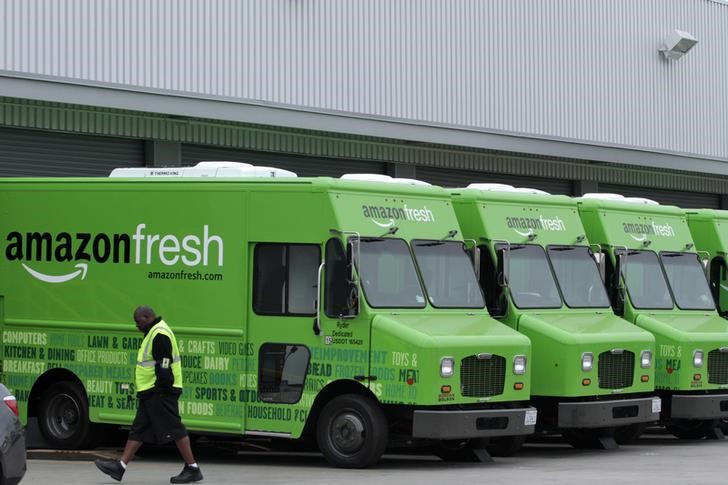Street Calls of the Week
On Friday, Bernstein analysts provided insights into the U.S. Retail & E-Commerce landscape, highlighting Amazon (NASDAQ:AMZN)'s continued dominance in the market. Amazon holds approximately 40% of the U.S. e-commerce market share, a position bolstered by its comprehensive Prime service, which offers benefits like fast, free shipping and a broad selection through its marketplace platform.
Despite Amazon's stronghold, Walmart (NYSE:WMT) is identified as having the potential to become a leader in the e-grocery space, backed by its significant scale and grocery expertise. Bernstein's proprietary survey indicates that staple items constitute nearly 70% of Walmart's sales, compared to 53% at Amazon.
While the focus on lower-margin staples could present challenges, analysts believe Walmart's grocery strength is a strategic advantage in e-commerce. Amazon's robust 48.4% gross profit margin and strong return on equity of 23% demonstrate its ability to maintain profitability despite competitive pressures.
In contrast, Target (NYSE:TGT), with its emphasis on discretionary categories, is most vulnerable to e-commerce shifts. However, it may struggle to grow e-commerce profitability due to a smaller scale and reliance on labor-intensive store fulfillment methods. Costco (NASDAQ:COST) has taken a different approach by partnering with Instacart (NASDAQ:CART) for same-day grocery delivery, avoiding the high costs of in-house fulfillment.
The report also discusses the balance between first-party (1P) and third-party (3P) sales across different retailers. Amazon's hybrid model sees roughly one-third of its Gross Merchandise Value (GMV) from 1P sales, while Walmart, Target, and Costco have a larger share of 1P sales.
The analysts suggest that retailers with larger 3P marketplaces may have an edge in growing advertising and marketplace fee revenues. Although Walmart's advertising revenue is currently a low single-digit percentage of its GMV, there is potential for growth in its marketplace, though it may not reach Amazon's levels.
E-commerce profitability, as per the report, is highly dependent on scale in the U.S. due to high labor costs. While Amazon leads in non-grocery segments, Walmart is seen as one of the few retailers that can profitably expand in e-grocery. Walmart's brand equity, competitive pricing, and extensive store network provide a strong foundation for success in online grocery sales. To enhance profitability, Walmart is expected to focus on alternative revenue streams and explore automation to reduce e-commerce costs.
For deeper insights into Amazon's financial performance and competitive position, InvestingPro subscribers can access comprehensive analysis, including 13 additional ProTips and detailed valuation metrics in the Pro Research Report, helping investors make more informed decisions in this dynamic retail landscape.
In other recent news, Amazon Ads has introduced an AI-powered SQL generator for advertisers, aiming to optimize the process of generating insights from advertising data. The company, which has maintained robust revenue growth of approximately 12% over the past year, reaching $620 billion, continues to invest in AI across its services.
Amazon Web Services (AWS), Amazon's cloud computing division, is set to invest an estimated $11 billion in Georgia to expand its infrastructure. This move is part of a broader strategy to fortify Amazon's standing in the fiercely competitive cloud computing market.
In a recent development, Honda Motor Company (NYSE:HMC) has partnered with AWS to transform its automobile lineup into software-defined vehicles (SDVs). This collaboration seeks to expedite the development of new electric vehicle capabilities and mobility solutions.
Anthropic, an AI startup with significant backing from Amazon, is reportedly in advanced negotiations to raise $2 billion, potentially raising the startup's valuation to $60 billion. Amazon has also secured a warrant to purchase up to 1.16 million shares in Jabil, a manufacturing services firm.
Loop Capital has recently reaffirmed a Buy rating for Amazon, citing strong demand and a positive margin outlook for AWS and the company's retail operations.
This article was generated with the support of AI and reviewed by an editor. For more information see our T&C.
